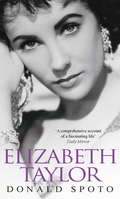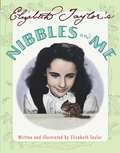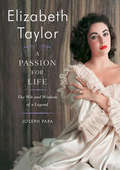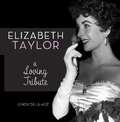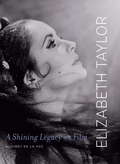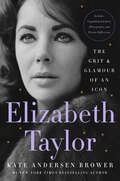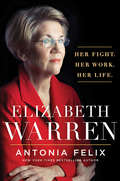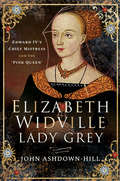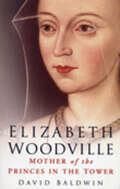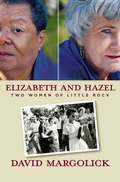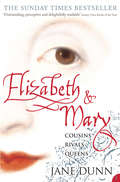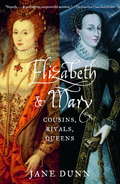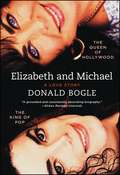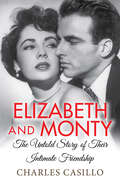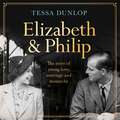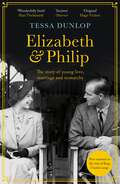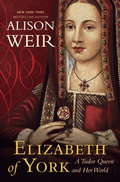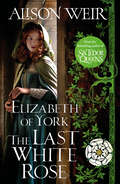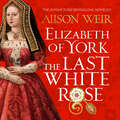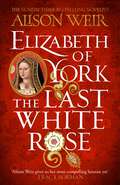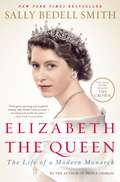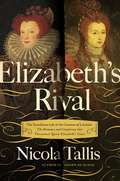- Table View
- List View
Elizabeth Taylor
by Donald SpotoElizabeth Taylor has been called the last great star of Hollywood's Golden Age. Her legendary beauty and luminous performances continue to enthral movie fans nearly seventy years after she made her screen debut, aged only ten. From the wide-eyed MGM ingénue she became both a respected, double Oscar-winning actress and a larger-than-life, million-dollar movie star; a scandalous tabloid favourite and a dedicated activist. She was a wife, a widow, a lover and a mother; as multi-faceted as the diamonds she adored. Elizabeth Taylor's life - and loves - never failed to capture the imagination of the world.With comprehensive and perceptive insights into her iconic movie career and her fascinating relationships, including her passionate romance with Richard Burton, Donald Spoto's peerless biography offers a captivating portrait of a much-loved, and much-missed, Hollywood legend.
Elizabeth Taylor's Nibbles and Me
by Elizabeth TaylorIn 1946, Elizabeth Taylor -- then fourteen and a major star at MGM -- published a book about her pet chipmunk, Nibbles. With wit, charm, and remarkable skill, she related the adventures and mishaps of her high-spirited friend. She and Nibbles were virtually inseparable during the shooting of National Velvet and other films; in fact the chipmunk almost got to appear in Courage of Lassie -- but he was so well behaved that he didn't look real, and his scene was cut! Recounted here are such stories as the happiest birthday of her life, when she was given King Charles, the horse who was called The Pi in National Velvet, because only Elizabeth could ride him.
Elizabeth Taylor, A Passion for Life
by Joseph PapaFrom the time she appeared in National Velvet, the film that skyrocketed her to international fame at age twelve in 1944, until her death, Elizabeth Taylor's beauty, allure, and personal strength captivated the world. In a career that spanned more than sixty years, she brought her raw talent and magnetism to bear in now classic films such as Father of the Bride, Suddenly, Last Summer, Cat on a Hot Tin Roof, Giant, Cleopatra, and Who's Afraid of Virginia Woolf?. Off screen, she lived just as passionately. That intensity brought her enormous joy and pain-and notoriety, whether it was from her vast collections of extraordinary fine jewelry and art to her battles with addiction and ill heath, from her internationally recognized humanitarian efforts on behalf of AIDS to her scandalous love affairs and seven highly scrutinized marriages. This anthology reveals the candor and honesty with which the actress led her extraordinary life. Here are Elizabeth's first-person reflections on her childhood, career, love and marriages, motherhood, beauty, aging, extravagances, charity, and sense of self. Whether witty or poignant, these words are always demonstrative of her generous, unapologetic, and fiercely determined nature, reflecting the essence of a great star and legendary modern woman.
Elizabeth Taylor, A Passion for Life
by Joseph PapaFrom the time she appeared in National Velvet, the film that skyrocketed her to international fame at age twelve in 1944, until her death, Elizabeth Taylor's beauty, allure, and personal strength captivated the world. In a career that spanned more than sixty years, she brought her raw talent and magnetism to bear in now classic films such as Father of the Bride, Suddenly, Last Summer, Cat on a Hot Tin Roof, Giant, Cleopatra, and Who's Afraid of Virginia Woolf?. Off screen, she lived just as passionately. That intensity brought her enormous joy and pain--and notoriety, whether it was from her vast collections of extraordinary fine jewelry and art to her battles with addiction and ill heath, from her internationally recognized humanitarian efforts on behalf of AIDS to her scandalous love affairs and seven highly scrutinized marriages.This anthology reveals the candor and honesty with which the actress led her extraordinary life. Here are Elizabeth's first-person reflections on her childhood, career, love and marriages, motherhood, beauty, aging, extravagances, charity, and sense of self. Whether witty or poignant, these words are always demonstrative of her generous, unapologetic, and fiercely determined nature, reflecting the essence of a great star and legendary modern woman.
Elizabeth Taylor: A Loving Tribute
by Cindy De La HozFrom National Velvet to Cat on a Hot Tin Roof, through eight marriages, White Diamonds, and years of tireless humanitarian work, Elizabeth Taylor achieved truly iconic status. She made her screen debut in 1942 and ever after the public has been enamored of the famously violet-eyed legend. Why we love her is easy to see--we were astonished by her beauty, engrossed by her movie performances, and fascinated by her jet-setting lifestyle. This little book offers up more reminders of why, for more than seventy years, we always loved Elizabeth Taylor.
Elizabeth Taylor: A Shining Legacy on Film
by Cindy De La HozA film retrospective that spans Taylor's 70-year career featuring ?behind-the-scenesOCO stories and rare photos. "
Elizabeth Taylor: The Grit & Glamour of an Icon
by Kate Andersen BrowerFrom the #1 New York Times bestselling author of The Residence and First Women, the first ever authorized biography of the most famous movie star of the twentieth century, Elizabeth Taylor.No celebrity rivals Elizabeth Taylor’s glamour and guts or her level of fame. She was the last major star to come out of the old Hollywood studio system and she is a legend known for her beauty and her magnetic screen presence in a career that spanned most of the twentieth century and nearly sixty films. But her private life was even more compelling than her Oscar-winning on-screen performances. During her seventy-nine years of rapid-fire love and loss she was married eight times to seven different men. Above all, she was a survivor—by the time she was twenty-six she was twice divorced and once widowed. Her life was a soap opera that ended in a deeply meaningful way when she became the first major celebrity activist to lead the fight against HIV/AIDS. A co-founder of amfAR, she raised more than $100 million for research and patient care. She was also a shrewd businesswoman who made a fortune as the first celebrity perfumer who always demanded to be paid what she was worth.In the first ever authorized biography of the Hollywood icon, Kate Andersen Brower reveals the world through Elizabeth’s eyes. Brower uses Elizabeth’s unpublished letters, diary entries, and off-the-record interview transcripts as well as interviews with 250 of her closest friends and family to tell the full, unvarnished story of her remarkable career and her explosive private life that made headlines worldwide. Elizabeth Taylor captures this intelligent, empathetic, tenacious, volatile, and complex woman as never before, from her rise to massive fame at age twelve in National Velvet to becoming the first to negotiate a million-dollar salary for a film, from her eight marriages and enduring love affair with Richard Burton to her lifelong battle with addiction and her courageous efforts as an AIDS activist. Here is a fascinating and complete portrait worthy of the legendary star and her legacy.Elizabeth Taylor features a photo insert.
Elizabeth Warren: Her Fight. Her Work. Her Life.
by Antonia FelixA breakthrough Elizabeth Warren biography by best-selling author Antonia Felix.Elizabeth Warren's rise as one of America's most powerful women is a stirring lesson in persistence. From her fierce support of the middle class to her unapologetic response to political bullies, Warren is known as a passionate yet plain-speaking champion of equity and fairness. In the wake of one fellow senator's effort to silence her in 2016, three words became a rallying cry across the country:Nevertheless, she persisted...In this Elizabeth Warren book, best-selling author Antonia Felix carries readers from Warren's hardscrabble roots in Norman, Oklahoma, to her career as one of the nation's most distinguished legal scholars and experts on the economics of working Americans. Felix reveals how Senator Elizabeth Warren brought her expertise to Washington to become an icon of progressive politics in a deeply divided nation, and weaves together never-before-told stories from those who have journeyed with Warren from Oklahoma to the halls of power.Praise for Elizabeth Warren: Her Fight. Her Work. Her Life.:"Many politicians focus on the 'me'. Elizabeth Warren has always been about the 'we'—that sacred American bond of equal justice for all that Dr. King fought for. Felix's biography explains why we need her 'persistent' voice more than ever, now and in the future." — Congressman John Lewis"Felix is an excellent writer, and her book is, at its best, quite interesting." — NPR Books
Elizabeth Widville, Lady Grey: Edward IV's Chief Mistress and the 'Pink Queen'
by John Ashdown-HillThe author of The Mythology of the &“Princes in the Tower&” separates fact from fiction in this biography of an influential former queen of England. Wife to Edward IV and mother to the Princes in the Tower and later Queen Elizabeth of York, Elizabeth Widville was a central figure during the War of the Roses. Much of her life is shrouded in speculation and myth—even her name, commonly spelled &“Woodville,&” is a hotly contested issue. In this fascinating and insightful biography, Dr. John Ashdown-Hill sheds light on the truth of her life. Born in the turbulent fifteenth century, she was famed for her beauty and controversial second marriage to Edward IV, who she married just three years after he had displaced the Lancastrian Henry VI and claimed the English throne. As Queen Consort, Elizabeth&’s rise from commoner to royalty continues to capture modern imagination. Undoubtedly, it enriched the position of her family. Her elevated position and influence invoked hostility from Richard Neville, the &“Kingmaker,&” which later led to open discord and rebellion. Throughout her life and even after the death of her husband, Elizabeth remained politically influential: briefly proclaiming her son King Edward V of England before he was deposed by her brother-in-law, the infamous Richard III, she would later play an important role in securing the succession of Henry Tudor in 1485 and his marriage to her daughter Elizabeth of York, thus and ending the War of the Roses. An endlessly enigmatic, historical figure, Elizabeth Widville has been obscured by dramatizations and misconceptions. In Elizabeth Widville, Lady Grey, Ashdown-Hill attempts to set the record straight.
Elizabeth Woodville: Mother of the Princes in the Tower
by David BaldwinElizabeth Woodville is undoubtedly a historical character whose life no novelist would ever have dared invent. She has been portrayed as an enchantress; as an unprincipled advancer of her family's fortunes and a plucky but pitiful queen in Shakespeare's histories. She has been alternatively championed and vilified by her contemporaries and five centuries of historians, dramatists and novelists, but what was she really like? In this revealing account of Elizabeth's life David Baldwin sets out to tell the story of this complex and intriguing woman. Was she the malign influence many of her critics held her to be? Was she a sorceress who bewitched Edward IV? What was the fate of her two sons, the 'Princes in the Tower'? What did she, of all people, think had become of them, and why did Richard III mount a campaign of vilification against her? David Baldwin traces Elizabeth's career and her influence on the major events of her husband Edward IV's reign, and in doing so he brings to life the personal and domestic politics of Yorkist England and the elaborate ritual of court life.
Elizabeth and Hazel: Two Women of Little Rock
by David MargolickThe names Elizabeth Eckford and Hazel Bryan Massery may not be well known, but the image of them from September 1957 surely is: a black high school girl, dressed in white, walking stoically in front of Little Rock Central High School, and a white girl standing directly behind her, face twisted in hate, screaming racial epithets. This famous photograph captures the full anguish of desegregation--in Little Rock and throughout the South--and an epic moment in the civil rights movement. In this gripping book, David Margolick tells the remarkable story of two separate lives unexpectedly braided together. He explores how the haunting picture of Elizabeth and Hazel came to be taken, its significance in the wider world, and why, for the next half-century, neither woman has ever escaped from its long shadow. He recounts Elizabeth's struggle to overcome the trauma of her hate-filled school experience, and Hazel's long efforts to atone for a fateful, horrible mistake. The book follows the painful journey of the two as they progress from apology to forgiveness to reconciliation and, amazingly, to friendship. This friendship foundered, then collapsed--perhaps inevitably--over the same fissures and misunderstandings that continue to permeate American race relations more than half a century after the unforgettable photograph at Little Rock. And yet, as Margolick explains, a bond between Elizabeth and Hazel, silent but complex, endures.
Elizabeth and Mary: Cousins, Rivals, Queens
by Jane DunnTheir enemies branded them both murderesses, whores and daughters of the devil. Elizabeth’s supporters anointed her a hero and savior, while Mary’s faithful invested her as a saint and martyr. Reigning side by side, but yet never meeting face-to-face, these queens were inexorably linked in a tumultuous relationship that, until now, has never fully been revealed and explored.Elizabeth & Mary: Cousins, Rivals, Queens is master biographer Jane Dunn’s richly textured portrait of two incredible women. A story of a relationship punctuated by reversals of fortune; murder mysteries; sexual intrigue; reckless behavior, heated battles and cold war, Elizabeth & Mary is staged against a past as dark and dangerous as it was vibrantly alive.Dunn shows the indissoluble bond between the queens was forged by two opposing forces; their shared inheritance and rivalry for Elizabeth’s crown set against their natural solidarity as ruling females in an overwhelmingly masculine world. She delves behind Elizabeth’s reputation as steely virgin queen, using her celibacy as a weapon, valuing reason and duty above all. She looks at Mary as celebrity queen, femme fatale and flawed heroine, a woman who capped the theatre of her death in a brilliant cloak of redemption. And she corrects many misconceptions about her subjects, revealing Mary as a more serious contender for power than had been previously thought, and Elizabeth as far more vulnerable than her formidable reputation.Intelligent and completely riveting, this beautifully produced and lavishly illustrated book masterfully juxtaposes the histories of two remarkable women, culminating in tragedy, as Elizabeth the victor—hesitantly—signed her cousin’s death warrant.
Elizabeth and Mary: Cousins, Rivals, Queens
by Jane DunnThe first dual biography of two of the world’s most remarkable women—Elizabeth I of England and Mary Queen of Scots—by one of Britain’s “best biographers” (The Sunday Times). In a rich and riveting narrative, Jane Dunn reveals the extraordinary rivalry between the regal cousins. It is the story of two queens ruling on one island, each with a claim to the throne of England, each embodying dramatically opposing qualities of character, ideals of womanliness (and views of sexuality) and divinely ordained kingship. As regnant queens in an overwhelmingly masculine world, they were deplored for their femaleness, compared unfavorably with each other and courted by the same men. By placing their dynamic and ever-changing relationship at the center of the book, Dunn illuminates their differences. Elizabeth, inheriting a weak, divided country coveted by all the Catholic monarchs of Europe, is revolutionary in her insistence on ruling alone and inspired in her use of celibacy as a political tool—yet also possessed of a deeply feeling nature. Mary is not the romantic victim of history but a courageous adventurer with a reckless heart and a magnetic influence over men and women alike. Vengeful against her enemies and the more ruthless of the two queens, she is untroubled by plotting Elizabeth’s murder. Elizabeth, however, is driven to anguish at finally having to sanction Mary’s death for treason. Working almost exclusively from contemporary letters and writings, Dunn explores their symbiotic, though never face-to-face, relationship and the power struggle that raged between them. A story of sex, power and politics, of a rivalry unparalleled in the pages of English history, of two charismatic women—told in a masterful double biography. From the Hardcover edition.
Elizabeth and Michael: The Queen of Hollywood and the King of Pop—A Love Story
by Donald BogleOne of the country's leading authorities on popular entertainment presents an eye-opening and unique biography of two larger-than-life legends--Elizabeth Taylor and Michael Jackson--and their unlikely yet enduring friendship.From the moment Elizabeth Taylor and Michael Jackson met, they were hooked on each other. He peered into her violet eyes and was transfixed; she, in turn, was dazzled by his talent, intrigued by his sweet-tempered childlike personality, and moved by the stories she had already heard about his troubled early life. Soon a deep friendship blossomed, unexpectedly unlike anything either had ever experienced. Through thick and thin, through their various emotional upheavals, through the peaks and valleys of their careers, through their personal traumas and heartaches, through the unending health issues and extreme physical pain that each experienced, and through the glare of the often merciless public spotlight, their bond held them together, and their love for each other endured. Donald Bogle skillfully recreates the moving narrative of Taylor and Jackson's experiences together and their intense emotional connection, without shying away from the controversies that swirled around them. Through interviews with friends and acquaintances of the two stars, as well as anonymous but credible sources, Elizabeth and Michael emerges as a tender, intimate look at this famous "odd couple" and a treasure to their millions of fans.
Elizabeth and Monty: The Untold Story of Their Intimate Friendship
by Charles CasilloViolet-eyed siren Elizabeth Taylor and classically handsome Montgomery Clift were the most gorgeous screen couple of their time. Over two decades of friendship they made, separately and together, some of the era&’s defining movies—including Cat on a Hot Tin Roof, The Misfits, Suddenly, Last Summer, and Cleopatra. Yet the relationship between these two figures—one a dazzling, larger-than-life star, the other hugely talented yet fatally troubled—has never truly been explored until now. &“Monty, Elizabeth likes me, but she loves you.&” —Richard Burton When Elizabeth Taylor was cast opposite Montgomery Clift in A Place in the Sun, he was already a movie idol, with a natural sensitivity that set him apart. At seventeen, Elizabeth was known for her ravishing beauty rather than her talent. Directors treated her like a glamorous prop. But Monty took her seriously, inspiring and encouraging her. In her words, &“That&’s when I began to act.&” To Monty, she was &“Bessie Mae,&” a name he coined for her earthy, private side. The press clamored for a wedding, convinced this was more than friendship. The truth was even more complex. Monty was drawn to women but sexually attracted to men—a fact that, if made public, would destroy his career. But he found acceptance and kinship with Elizabeth. Her devotion was never clearer than after his devastating car crash near her Hollywood home, when she crawled into the wreckage and saved him from choking. Monty&’s accident shattered his face and left him in constant pain. As he sank into alcoholism and addiction, Elizabeth used her power to keep him working. In turn, through scandals and multiple marriages, he was her constant. Their relationship endured until his death in 1966, right before he was to star with her in Reflections in a Golden Eye. His influence continued in her outspoken support for the gay community, especially during the AIDS crisis. Far more than the story of two icons, this is a unique and extraordinary love story that shines new light on both stars, revealing their triumphs, demons—and the loyalty that united them to the end.
Elizabeth and Philip: A Story of Young Love, Marriage and Monarchy
by Tessa DunlopShe was peaches-and-cream innocence; he was a handsome war hero. Both had royal blood coursing through their veins. The marriage of Britain's Princess Elizabeth to Lt Philip Mountbatten in November 1947 is remembered as the beginning of an extraordinary, lifelong union but success was not guaranteed. Elizabeth and Philip: A Story of Young Love, Marriage and Monarchy plunges us back into 1940s Britain where a teenage Princess fell in love with a foreign Prince. Cue fears of a flirtatious 'Greek' fortune hunter stealing off with England's crown jewel and subsequent efforts by the Establishment to reframe Philip as the perfect fit for Britain's most famous family.Drawing on original newspaper archives and the opinions of Elizabeth and Philip's contemporaries still alive today, historian Dr Tessa Dunlop discovers a post-war world on the cusp of major change. Unprecedented polling on Philip's suitability was a harbinger of pressures to come for a couple whose marriage was branded the ultimate global fairytale. Theirs was a partnership like no other. Six years after Elizabeth promised to be an obedient wife Philip got down on bended knee and committed himself as the Queen's 'liege man of life and limb.'Published to coincide with the 75th anniversary of their marriage, this deeply touching history explores the ups and downs, the attraction and the tensions that defined an extraordinary relationship. The high stakes involved might have devoured a less committed pair - but not Elizabeth and Philip. They shared a common purpose, one higher even than marriage, with roots much deeper than young love. Happy and Glorious, for better or for worse, they were heavily invested in a God-given mission. Monarchy was the magic word.(P) 2022 Headline Publishing Group Ltd
Elizabeth and Philip: A Story of Young Love, Marriage and Monarchy
by Tessa DunlopShe was 'sugar pink' innocence; he was a handsome war hero. Both had royal blood coursing through their veins. The marriage of Britain's Princess Elizabeth to Lieutenant Philip Mountbatten in November 1947 is remembered as the beginning of an extraordinary, lifelong union but success was not guaranteed. Elizabeth and Philip: A Story of Young Love, Marriage and Monarchy plunges us back into the 1940s when a teenage princess fell in love with a foreign prince. Cue fears of a flirtatious 'Greek' fortune hunter stealing off with Britain's crown jewel and Philip's supporters scrambling to reframe him as a good fit for the Royal Family. Drawing on original newspaper archives and the opinions of Elizabeth and Philip's contemporaries, historian Dr Tessa Dunlop discovers a post-war world on the cusp of major change. Unprecedented polling on Philip's suitability was a harbinger of pressures to come for a couple whose marriage was branded the ultimate global fairytale. Theirs was a partnership like no other. Six years after Elizabeth promised to be an obedient wife Philip got down on bended knee at the coronation and committed himself as the Queen's 'liege man of life and limb.' Published 75 years after their marriage, this deeply touching history explores the ups and downs, the public appeal and the private tensions that defined an extraordinary relationship. The high stakes involved might have devoured a less committed pair - but Elizabeth and Philip shared a common purpose, one higher even than marriage, with roots much deeper than young love. Happy and Glorious, for better or for worse, how did their union succeed? Monarchy was the magic word.
Elizabeth and Philip: A Story of Young Love, Marriage and Monarchy
by Tessa DunlopShe was 'sugar pink' innocence; he was a handsome war hero. Both had royal blood coursing through their veins. The marriage of Britain's Princess Elizabeth to Lieutenant Philip Mountbatten in November 1947 is remembered as the beginning of an extraordinary, lifelong union but success was not guaranteed. Elizabeth and Philip: A Story of Young Love, Marriage and Monarchy plunges us back into the 1940s when a teenage princess fell in love with a foreign prince. Cue fears of a flirtatious 'Greek' fortune hunter stealing off with Britain's crown jewel and Philip's supporters scrambling to reframe him as a good fit for the Royal Family. Drawing on original newspaper archives and the opinions of Elizabeth and Philip's contemporaries, historian Dr Tessa Dunlop discovers a post-war world on the cusp of major change. Unprecedented polling on Philip's suitability was a harbinger of pressures to come for a couple whose marriage was branded the ultimate global fairytale. Theirs was a partnership like no other. Six years after Elizabeth promised to be an obedient wife Philip got down on bended knee at the coronation and committed himself as the Queen's 'liege man of life and limb.' Published 75 years after their marriage, this deeply touching history explores the ups and downs, the public appeal and the private tensions that defined an extraordinary relationship. The high stakes involved might have devoured a less committed pair - but Elizabeth and Philip shared a common purpose, one higher even than marriage, with roots much deeper than young love. Happy and Glorious, for better or for worse, how did their union succeed? Monarchy was the magic word.
Elizabeth of York: A Tudor Queen and Her World
by Alison WeirMany are familiar with the story of the much-married King Henry VIII of England and the celebrated reign of his daughter, Elizabeth I. But it is often forgotten that the life of the first Tudor queen, Elizabeth of York, Henry's mother and Elizabeth's grandmother, spanned one of England's most dramatic and perilous periods. Now New York Times bestselling author and acclaimed historian Alison Weir presents the first modern biography of this extraordinary woman, whose very existence united the realm and ensured the survival of the Plantagenet bloodline. Her birth was greeted with as much pomp and ceremony as that of a male heir. The first child of King Edward IV, Elizabeth enjoyed all the glittering trappings of royalty. But after the death of her father; the disappearance and probable murder of her brothers--the Princes in the Tower; and the usurpation of the throne by her calculating uncle Richard III, Elizabeth found her world turned upside-down: She and her siblings were declared bastards. As Richard's wife, Anne Neville, was dying, there were murmurs that the king sought to marry his niece Elizabeth, knowing that most people believed her to be England's rightful queen. Weir addresses Elizabeth's possible role in this and her covert support for Henry Tudor, the exiled pretender who defeated Richard at the Battle of Bosworth and was crowned Henry VII, first sovereign of the House of Tudor. Elizabeth's subsequent marriage to Henry united the houses of York and Lancaster and signaled the end of the Wars of the Roses. For centuries historians have asserted that, as queen, she was kept under Henry's firm grasp, but Weir shows that Elizabeth proved to be a model consort--pious and generous--who enjoyed the confidence of her husband, exerted a tangible and beneficial influence, and was revered by her son, the future King Henry VIII. Drawing from a rich trove of historical records, Weir gives a long overdue and much-deserved look at this unforgettable princess whose line descends to today's British monarch--a woman who overcame tragedy and danger to become one of England's most beloved consorts. Praise for Alison Weir's Mary Boleyn, named one of the Best Books of the Year by The Chicago Tribune "This nuanced, smart, and assertive biography reclaims the life of a Tudor matriarch."--Publishers Weekly "Weir has achieved the enviable skill of blending the necessary forensic and analytical tasks of academia with the passionate engagement that avocational history lovers crave."--Bookreporter "Top-notch . . . This book further proves that [Weir] is a historian of the highest caliber."--Washington Independent Review of Books "A refreshing change from recent books on the subject . . . If you want to learn more about this often-maligned woman of the sixteenth century, this is a must-read."--The Free Lance-Star "Weir's research is always first-rate and her narratives accessible. In her latest book, the author has to navigate the historical minefields of gossip, fiction, and conjecture to finally get at the truth."--Tucson Citizen "Engaging . . . Weir matches her usual professional skills in research and interpretation to her customary, felicitous style."--Booklist
Elizabeth of York: Tudor Rose Novel 1
by Alison WeirYou've read Alison Weir's bestselling Six Tudor Queens. This is her captivating new novel. 'Alison Weir gives us her most compelling heroine yet... This is where the story of the Tudors begins and is historical fiction at its absolute best' TRACY BORMAN'One of the great women of history... History has the best stories and they should all be told like this' CONN IGGULDEN--- Mother. Survivor. Queen. ---AN ENGLISH PRINCESS, BORN INTO A WAR BETWEEN TWO FAMILIES.Eldest daughter of the royal House of York, Elizabeth dreams of a crown to call her own. But when her beloved father, King Edward, dies suddenly, her destiny is rewritten.Her family's enemies close in. Two young princes are murdered in the Tower. Then her uncle seizes power - and vows to make Elizabeth his queen.But another claimant seeks the throne, the upstart son of the rival royal House of Lancaster. Marriage to this Henry Tudor would unite the white rose of York and the red of Lancaster - and change everything.A great new age awaits. Now Elizabeth must choose her allies - and husband - wisely, and fight for her right to rule. ---PRAISE FOR THE SIX TUDOR QUEENS SERIES:'This series is a serious achievement' The Times'Weir is excellent on the little details that bring a world to life' Guardian'This brilliant series has brought Henry VIII's six wives to life as never before' Tracy Borman 'Profoundly moving... lingers long after the last page' Elizabeth Fremantle'Well researched and engrossing' Good Housekeeping'Vivid characters and a wonderful sense of time and place' Barbara Erskine'Hugely enjoyable . . . Alison Weir knows her subject and has a knack for the telling and textural detail' Daily Mail
Elizabeth of York: Tudor Rose Novel 1
by Alison WeirBrand-new historical fiction from the author of the Sunday Times-bestselling Six Tudor Queens series. This is the spellbinding, untold story of Elizabeth of York, the first Tudor queen.'Alison Weir gives us her most compelling heroine yet... This is where the story of the Tudors begins and is historical fiction at its absolute best' TRACY BORMAN'One of the great women of history... History has the best stories and they should all be told like this' CONN IGGULDEN--- Mother. Survivor. Queen. ---AN ENGLISH PRINCESS, BORN INTO A WAR BETWEEN TWO FAMILIES.Eldest daughter of the royal House of York, Elizabeth dreams of a crown to call her own. But when her beloved father, King Edward, dies suddenly, her destiny is rewritten.Her family's enemies close in. Two young princes are murdered in the Tower. Then her uncle seizes power - and vows to make Elizabeth his queen.But another claimant seeks the throne, the upstart son of the rival royal House of Lancaster. Marriage to this Henry Tudor would unite the white rose of York and the red of Lancaster - and change everything.A great new age awaits. Now Elizabeth must choose her allies - and husband - wisely, and fight for her right to rule. ---PRAISE FOR THE SIX TUDOR QUEENS SERIES:'This series is a serious achievement' The Times'Weir is excellent on the little details that bring a world to life' Guardian'This brilliant series has brought Henry VIII's six wives to life as never before' Tracy Borman 'Profoundly moving... lingers long after the last page' Elizabeth Fremantle'Well researched and engrossing' Good Housekeeping'Vivid characters and a wonderful sense of time and place' Barbara Erskine'Hugely enjoyable . . . Alison Weir knows her subject and has a knack for the telling and textural detail' Daily Mail(P) 2022 Headline Publishing Group Ltd
Elizabeth of York: Tudor Rose Novel 1
by Alison WeirThe captivating new Tudor novel from Alison Weir, Sunday Times bestselling author of Six Tudor Queens.'Alison Weir gives us her most compelling heroine yet... This is where the story of the Tudors begins' Tracy Borman'History has the best stories and they should all be told like this' Conn Iggulden'A stunning read, and the perfect piece of historical fiction' Reader review ⭐ ⭐⭐ ⭐⭐'This novel captured my imagination, educated me and emotionally moved me' Reader review ⭐ ⭐⭐ ⭐⭐---A princess born into a war between two families...Firstborn of the royal House of York, Elizabeth dreams of wearing a crown. But in England, queens do not rule.When her beloved father, King Edward, dies suddenly, his brother seizes power. Two young princes disappear into the Tower. Yet another claimant seeks the crown, the upstart heir of the rival House of Lancaster. Marriage to this Henry Tudor would unite their warring families - and help Elizabeth to the throne she knows is hers by right.A glorious new age awaits. Now Elizabeth must choose her allies wisely as she fights to become mother and queen of a great new dynasty.Elizabeth of York.The first Tudor queen.Her story.---READERS FELL IN LOVE WITH ELIZABETH OF YORK...'I found her an inspirational woman, full of strength...I truly adored this book''She becomes the matriarch of the Tudor destiny after a series of intrigue, conflict, and most likely murder... a brilliant read''Alison Weir's writing just makes history that bit more exciting and accessible''It was refreshing to read such a detailed and informative book of an almost forgotten Queen''An amazing read as expected from Alison Weir, she breathes life into Elizabeth and those around her'
Elizabeth the Queen: The Life of a Modern Monarch
by Sally Bedell SmithIn this magisterial new biography, New York Times bestselling author Sally Bedell Smith brings to life one of the world's most fascinating and enigmatic women: Queen Elizabeth II. From the moment of her ascension to the throne in 1952 at the age of twenty-five, Queen Elizabeth II has been the object of unparalleled scrutiny. But through the fog of glamour and gossip, how well do we really know the world's most famous monarch? Drawing on numerous interviews and never-before-revealed documents, acclaimed biographer Sally Bedell Smith pulls back the curtain to show in intimate detail the public and private lives of Queen Elizabeth II, who has led her country and Commonwealth through the wars and upheavals of the last sixty years with unparalleled composure, intelligence, and grace. In Elizabeth the Queen, we meet the young girl who suddenly becomes "heiress presumptive" when her uncle abdicates the throne. We meet the thirteen-year-old Lilibet as she falls in love with a young navy cadet named Philip and becomes determined to marry him, even though her parents prefer wealthier English aristocrats. We see the teenage Lilibet repairing army trucks during World War II and standing with Winston Churchill on the balcony of Buckingham Palace on V-E Day. We see the young Queen struggling to balance the demands of her job with her role as the mother of two young children. Sally Bedell Smith brings us inside the palace doors and into the Queen's daily routines--the "red boxes" of documents she reviews each day, the weekly meetings she has had with twelve prime ministers, her physically demanding tours abroad, and the constant scrutiny of the press--as well as her personal relationships: with Prince Philip, her husband of sixty-four years and the love of her life; her children and their often-disastrous marriages; her grandchildren and friends. Compulsively readable and scrupulously researched, Elizabeth the Queen is a close-up view of a woman we've known only from a distance, illuminating the lively personality, sense of humor, and canny intelligence with which she meets the most demanding work and family obligations. It is also a fascinating window into life at the center of the last great monarchy.
Elizabeth's Rival: The Tumultuous Life Of The Countess Of Leicester: The Romance And Conspiracy That Threatened Queen Elizabeth's Court
by Nicola TallisFavorite, foe, rival—a gripping tale of the countess who dared cross a queen amidst the dangerous intrigues of Elizabethan England. A kinswoman to Elizabeth I, Lettice Knollys had begun the Queen’s glittering reign basking in favor and success. It was an honor that she would enjoy for two decades. However, on the morning of September 21st, 1578, Lettice made a fateful decision. When the Queen learned of it, the consequences were swift. Lettice had dared to marry without the Queen’s consent. But worse, her new husband was Robert Dudley, Earl of Leicester, the Queen’s favorite and one-time suitor. Though she would not marry him herself, Elizabeth was fiercely jealous of any woman who showed an interest in Leicester. Knowing that she would likely earn the Queen’s enmity, Lettice married Leicester in secret, leading to her permanent banishment from court. Elizabeth never forgave the new Countess for what she perceived to be a devastating betrayal, and Lettice permanently forfeited her favor. She had become not just Queen Elizabeth’s adversary. She was her rival. But the Countess’ story does not end there. Surviving the death of two husbands and navigating the courts of three very different monarchs: Henry VIII, Elizabeth I, and Charles I, Lettice’s story offers an extraordinary and intimate perspective on the world she lived in.
